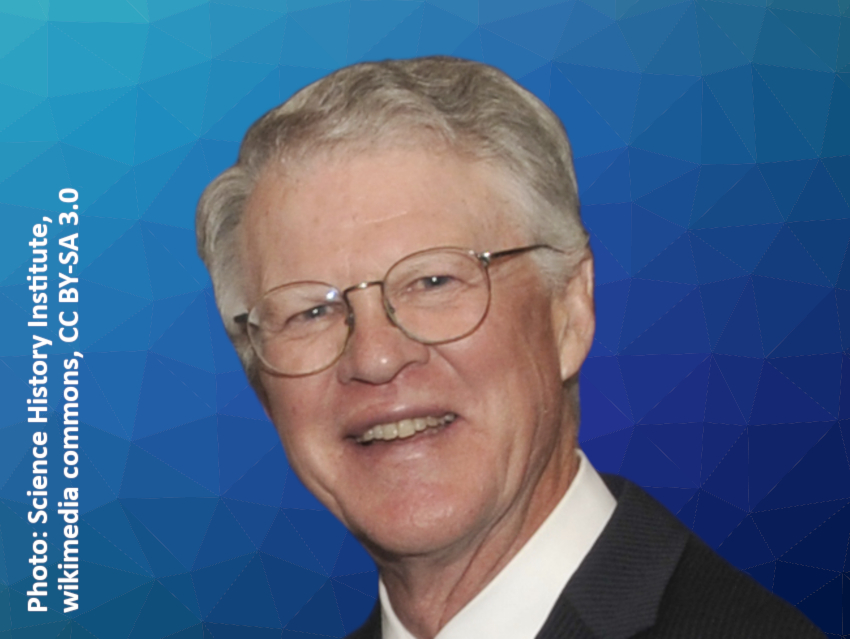Peter B. Dervan, Professor Emeritus at the California Institute of Technology (Caltech), Pasadena, CA, USA, has received the 2022 Priestley Medal, the highest honor of the American Chemical Society (ACS). The prize is awarded annually to recognize distinguished services to chemistry.
Dervan is honored for “his pioneering contributions in the rational design of molecules that bind sequence-specifically to DNA, work that has been foundational at the chemistry-biology interface.” The award was presented at a national awards ceremony held in conjunction with the ACS Spring Meeting & Exposition 2022.
With his work directed toward understanding the chemical principles for the sequence-specific recognition of DNA, Dervan has created a new field of bioorganic chemistry. He combined organic synthesis, physical chemistry, and biology to create synthetic molecules with affinities for predetermined DNA sequences. The work could have significant implications for medicine.
Peter B. Dervan studied chemistry at Boston College, MA, USA. He then worked with Jerome A. Berson at Yale University, New Haven, CT, USA, where he received his Ph.D. in physical organic chemistry in 1972. He spent a year at Stanford University, CA, USA, as a Postdoctoral Fellow. Dervan joined Caltech as an Assistant Professor in 1973. He was promoted to Associate Professor in 1979 and to Full Professor in 1982. He served as the Chair of the Division of Chemistry and Chemical Engineering in 1994–1999 and as Vice-President for Development and Institute Relations in 2011 and 2012. Today, he is Bren Professor of Chemistry, Emeritus, at Caltech.
Among many other honors, Dervan has received the Arthur C. Cope Award from the ACS in 1993, the Maison de la Chimie Foundation Prize in 1996, the Linus Pauling Medal and the Richard C. Tolman Medal from the ACS in 1999, the Tetrahedron Prize in 2000, the Harvey Prize from the Technion, Haifa, Israel, in 2002, the U.S. National Medal of Science in 2006, the Frank H. Westheimer Medal from Harvard University, Cambridge, MA, USA, in 2009, and the Prelog Medal from the Swiss Federal Institute of Technology (ETH) Zurich in 2015. He is a Member of the U.S. National Academy of Sciences, the U.S. National Academy of Medicine, the American Academy of Arts and Sciences, and the American Philosophical Society, as well as a Foreign Member of the French Academy of Sciences and the German National Academy of Sciences.
Selected Publications
- RNA polymerase II trapped on a molecular treadmill: Structural basis of persistent transcriptional arrest by a minor groove DNA binder,
Juntaek Oh, Tiezheng Jia, Jun Xu, Jenny Chong, Peter B. Dervan, Dong Wang,
Proc. Natl. Acad. Sci. USA 2022.
https://doi.org/10.1073/pnas.2114065119 - Single position substitution of hairpin pyrrole-imidazole polyamides imparts distinct DNA-binding profiles across the human genome,
Hodaka Fujii, Paul B. Finn, Devesh Bhimsaria, Asfa Ali, Asuka Eguchi, Aseem Z. Ansari, Peter B. Dervan,
PLOS ONE 2020, 15, e0243905.
https://doi.org/10.1371/journal.pone.0243905 - Repression of the transcriptional activity of ERRα with sequence-specific DNA-binding polyamides,
Chien-yu Chen, Yang Li, Tiezheng Jia, Lina He, Alissa A. Hare, Amanda Silberstein, John Gallagher, Thomas F. Martinez, Joseph W. Stiles, Bogdan Olenyuk, Peter B. Dervan, Bangyan L. Stiles,
Med. Chem. Res. 2020, 29, 607–616.
https://doi.org/10.1007/s00044-019-02493-4 - Allosteric modulation of DNA by small molecules,
David M. Chenoweth, Peter B. Dervan,
Proc. Natl. Acad. Sci. USA 2009, 106, 13175–13179.
https://doi.org/10.1073/pnas.0906532106 - Addressing Single Molecules on DNA Nanostructures,
Justin D. Cohen, John P. Sadowski, Peter B. Dervan,
Angew. Chem. Int. Ed. 2007, 46, 7956–7959.
https://doi.org/10.1002/anie.200702767 - Suppression of androgen receptor-mediated gene expression by a sequence-specific DNA-binding polyamide,
Nicholas G. Nickols, Peter B. Dervan,
Proc. Natl. Acad. Sci. USA 2007, 104, 10418–10423.
https://doi.org/10.1073/pnas.0704217104 - DNA sequence-specific polyamides alleviate transcription inhibition associated with long GAA·TTC repeats in Friedreich’s ataxia,
Ryan Burnett, Christian Melander, James W. Puckett, Leslie S. Son, Robert D. Wells, Peter B. Dervan, Joel M. Gottesfeld,
Proc. Natl. Acad. Sci. USA 2006, 103, 11497–11502.
https://doi.org/10.1073/pnas.0604939103
Also of Interest
- Priestley Medal 2021 for Paul Alivisatos,
ChemistryViews 2021.
Highest honor of the American Chemical Society (ACS) presented to pioneer in nanomaterials - Priestley Medal 2020 for JoAnne Stubbe,
ChemistryViews 2020.
Highest honor of the American Chemical Society (ACS) presented to biochemistry pioneer - Priestley Medal 2019 for K. Barry Sharpless,
ChemistryViews 2019.
Highest honor of the American Chemical Society (ACS) presented to Nobel Laureate - Priestley Medal 2018 for Geraldine Richmond,
ChemistryViews 2018.
Highest honor of the American Chemical Society (ACS) presented to researcher at the University of Oregon, USA - Priestley Medal 2017 for Tobin J. Marks,
ChemistryViews 2017.
Highest honor of the American Chemical Society (ACS) presented to materials and organometallic chemist - Priestley Medal 2016 for Mostafa El-Sayed,
ChemistryViews 2016.
Highest honor of the American Chemical Society (ACS) presented to physical and nanomaterials chemist - Jacqueline K. Barton Awarded the Priestley Medal,
ChemistryViews 2015.
The highest honor of the American Chemical Society (ACS) has been awarded to Professor Jacqueline K. Barton, USA - Stephen Lippard Awarded the Priestley Medal,
ChemViews/Jonathan Faiz
ChemistryViews 2014.
Professor Stephen J. Lippard, USA, has been awarded the Priestley Medal, the highest honor of the ACS - Priestley Medal for Peter Stang,
Jonathan Faiz/ChemViews,
ChemistryViews 2013.
Peter Stang, University of Utah, USA, receives the highest honor of the American Chemical Society




